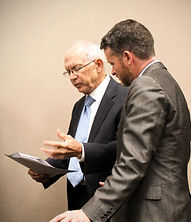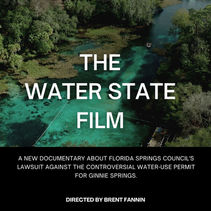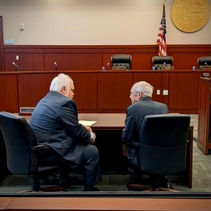
THE FIGHT AGAINST
NESTLE & GINNIE SPRINGS
The Florida Springs Council launched a lawsuit to stop the water use permit that allows the owners of Ginnie Springs* to pump nearly 1 million gallons of water per day from the springs to sell to Nestle/BlueTriton for bottling.
*Seven Springs Water Co., owned by the owners of Ginnie Springs Outdoors, holds and profits from the permit.
Photo by Merrillee Malwitz-Jipson
Watch the 14-minute Documentary
"The Water State" documents the fight against the permit that allows Seven Springs Water Company to pump nearly one million gallons of spring water per day from Ginnie Springs to sell to the bottling plant owned by BlueTriton (formerly Nestle Waters.) This film was completed before the May 2023 hearing.
Watch the full film at
Final Update
The hearing took place in the Division of Administrative Hearings on May 10, 2023.
In October of 2023 Administrative Law Judge (ALJ) Francine Ffolkes ruled in favor of Seven Springs Water Company.
The SRWMD then approved the permit on December 12, 2023.
The ALJ concluded that the Suwannee River Water Management District fulfilled the requirement (District Rule 40B-2.301(1)(c), Fla. Admin. Code) that the water use be “in the public interest” by confirming that the permit holder could process and sell the water. That is, the public interest was equated to the permit holder's private financial interests. During the hearing, the District made it clear that most of the thousands of public comments opposing the permit, and the harm it would cause to the springs and river, were not even taken into account when issuing the permit.
The Florida Springs Council has worked with springs advocates and partner organizations for nearly four years to stop this permit, and it is a devastating outcome for a spring and river system that is already suffering harm from over-pumping. We send a big "thank-you" to everyone who spoke out against this permit at the meeting and over the past few years. We all fought hard against the Seven Springs Water Co. permit. Although we are disappointed with the outcome, we appreciate everyone who got involved in the effort. Water use permitting is supposed to protect our springs and rivers from over-pumping, but this case is proof that the system in place is not what’s best for our water. We are determined to correct this failing system for the health and future of our springs.
Here are key takeaways from the outcome of this case:
-
There was one positive outcome. The first count of our challenge was won before the case was heard. BlueTriton, the company bottling and selling the spring water, will be listed on the permit, giving the District access to inspect and regulate the bottling facility. This wouldn’t have happened without legal action and the persistence of springs advocates.
-
This decision shows a failure of the permitting system, and fixing that broken system must be our focus. Water use permitting is supposed to protect our springs and rivers from over-pumping, but it is failing. The permit was approved even though it is clearly not in the public interest to increase pumping from a spring/river system already considered by the state as “in recovery,” a designation given to rivers “experiencing significant harm" to water levels and flow.
What’s next:
Since the ruling, FSC's legal team has considered all the possible paths forward. FSC is determined to pursue the path that would yield the widest-reaching results and most efficient use of our resources. Two paths stand out:
-
Take legal action to force DEP to adopt the "Harm Rule" - FSC is looking at legal action to force DEP to adopt an Outstanding Florida Springs harm rule as required by statute. In 2016, the Springs & Aquifer Protection Act was passed, requiring the Florida Department of Environmental Protection to “adopt uniform rules for issuing permits which prevent groundwater withdrawals that are harmful” to Outstanding Florida Springs. Instead of adopting this rule, DEP has ignored the law. If DEP had followed the law back in 2016, Seven Springs’ permit would have been denied or the bottling company would have been required to offset their withdrawals. DEP has yet to take any action to fulfill that 2016 directive, and legal action can force DEP to finally implement that rule.
-
Take legal action to force agencies to better define and implement the term "public interest" in water permitting. The ALJ’s decision along with the District’s testimony and actions in this case clearly demonstrate that the public interest is not being considered in consumptive water use permitting. Challenging the faulty rule itself is another option.

Florida Springs Council’s attorney Doug MacLaughlin with FSC Director Ryan Smart.

The hearing took place on May 10, 2023 in the Division of Administrative Hearings in Tallahassee. Here, an expert witness is questioned by the Seven Springs Water Company's attorney.

Florida Springs Council’s attorney Doug MacLaughlin with FSC Director Ryan Smart.
Florida Springs Council vs Seven Springs Water Co.
BACKGROUND
At this heart is this case is the requirement that water permits be in the Public Interest. Our case challenged whether District Rule 40B-2.301(1)(c), Fla. Admin. Code, was met by the Water Management District when this permit renewal was granted. That rule, often referred to as the “third prong” of the three-part water use permitting requirement, requires an applicant for a water use permit to provide reasonable assurance that the proposed water use is “consistent with the public interest.”
The Basics
Want to take a deep dive into the "Public Interest"
aspect of Florida Water Law?
The University of Florida's Law Conservation Clinic took a detailed look at the
public interest test in consumptive use permitting. Their report, as well as a
presentation, can be found at
https://www.floridaspringscouncil.org/inthepublicinterestwaterusepermits
What is Nestle's role?
While the case is often called the "Nestle" case, Nestle is not directly involved.
-
Seven Springs Water Co., owned by the owners of Ginnie Springs Outdoors, holds and profits from the permit.
-
The Suwannee River Water Management District granted the permit.
-
The Water Management District and Seven Springs Water Company were challenged by FSC in this legal case.
-
Seven Springs Water Company does not bottle water. They sell the water they pull for free to the bottling plant nearby, which was owned by Nestle Waters at the time of the original permit renewal. Nestle's purchase of the bottling plant just before the permit was renewed enabled the plant to triple their capacity, tripling the amount that would be pulled from the spring.
-
Nestle Waters North America sold their bottled water interests in 2021 and now operates as "BlueTriton".
Harm to the spring and river
Ginnie Springs flows into the Santa Fe River which is already suffering “significant harm” from over-pumping. The Santa Fe River no longer meets its mandated "MFL," Minimum Flow and Level, below which the river ecosystem experiences significant harm. According to the Florida Department of Environmental Protection, when fully operational, the pumping authorized under this permit will cause a 4 percent reduction in flows from Ginnie Springs to the Santa Fe River, as much as all other uses combined.
The Permit
On February 23rd, 2021 the Suwannee River Water Management District Governing Board (District) approved a controversial water use permit renewal requested by Seven Springs Water Company, owned by the operators of the Ginnie Springs campground, to provide nearly 1 million gallons of water per day to be bottled and sold by Nestle (now known as BlueTriton.)
The District approved the permit under protest after losing an earlier court case to Seven Springs Water Co. Nonetheless, in approving the water use permit, the District ignored a legal requirement to consider the public interest, violated their own rules, and exposed serious flaws in water use permitting.

The Florida Springs Council immediately filed a legal challenge to the permit to protect the rights of our members and protect the Santa Fe River. We petitioned for a Hearing in the Department of Administrative Hearings, or DOAH, the court where cases involving state agency actions are decided.
The legal challenge
We argue that the SRWMD was required to deny the permit for two reasons:
First, Seven Springs Water Co., the name under which the owners of Ginnie Springs applied for the permit, does not own or control the neighboring bottling facility where the water use will occur. Currently that facility is owned by BlueTriton (the new name of Nestle Waters North America.)
Under SRWMD rules, Seven Springs Water Co., therefore, does not have the legal right to conduct the water use. Without the actual water user on the permit, the SRWMD has no way to assure that the allocated water will be used in a reasonable and beneficial manner or enforce compliance with SRWMD rules. UPDATE MAY 2023: BlueTriton agreed to go onto the permit before the case began.
Second, the SRWMD Governing Board failed to consider whether issuing the consumptive use permit was “consistent with the public interest” as required by SRWMD rules and Florida Statute. The district's rules require that all permits pass a "Three Prong Test."
-
Is the water use reasonable-beneficial
-
Does the water use interfere with an existing legal use
-
Is the permit in the public interest
The SRWMD rules define “public interest” as the “broad-based interests and concerns that are collectively shared by members of a community or residents of the District or State.” These interests and concerns, which include environmental impacts, were not addressed in the permit application nor by the SRWMD Governing Board in making their decision to grant the permit.
Ensuring that a permit is in the “public interest” is the most important of the three prongs. It literally represents our interest in how our most important resource, groundwater, is used. Unfortunately, water management districts have stopped considering what is in the public’s best interest when issuing water use permits, even when the public makes their interests and concerns crystal clear. In this case, more than 19,000 people wrote comments to the SRWMD, the vast majority of which opposed issuing the permit because of the additional harm it would do to the Santa Fe River.
Access the full legal petition at https://www.floridaspringscouncil.org/_files/ugd/719d3f_2b32de36b91a4feba17be77f3501d1da.pdf
The hearing took place in the Division of Administrative Hearings on May 10, 2023.
In late 2023 the Administrative Law Judge ruled in favor of Seven Springs Water Company, recommending that the Suwannee River Water Management District approve the permit.

We have already passed the point of sustainable withdrawals in the Santa Fe River Basin because our water management districts have been asleep at the wheel.
Once again, non-profit advocacy groups like the Florida Springs Council are stepping in where our state agencies have failed. It’s time to draw a line in the sand and say no more. If Nestle wants our water, we are going to make them come and take it.
Ryan Smart,
Florida Springs Council
Executive Director
What you can do
We will continue to persue legal and policy avenues to protect Florida's springs from harmful water permitting. Sign up for a free Florida Springs Council membership to stay informed. An informed and vocal springs community is key to change, which is why we offer the membership for free. We need your participation, your calls and emails to decision-makers, your presence at meetings, your voice behind our mission.

































